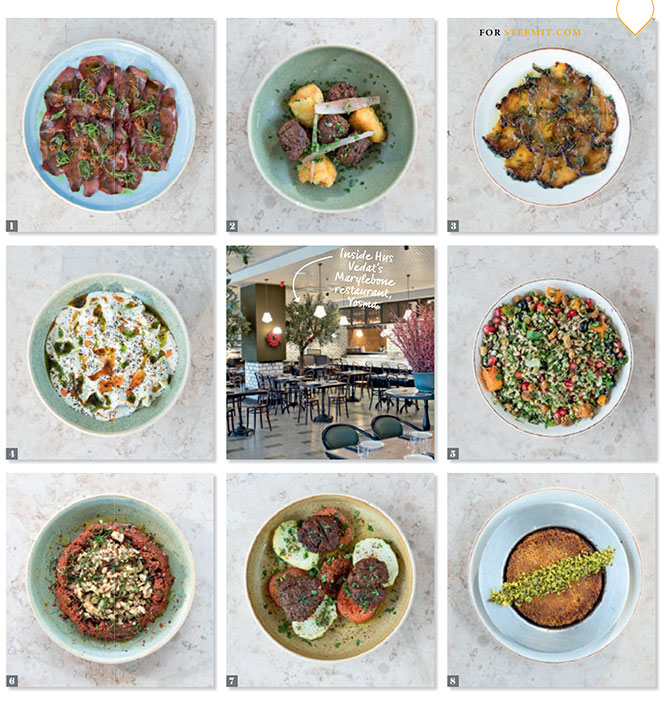Prima doners
Forget those 3am kebabs – Turkish cuisine can be refined as well as flavoursome. We meet the London-based chef who’s shaking things up in the kitchen.
If you’ve ever been to Turkey, you’ll have experienced the overwhelming generosity of Turkish hospitality. Your hosts will go out of their way to make sure you’re comfortable, happy and – most important of all – extremely well fed. Every occasion is an excuse to lay out gem-like olives, perfectly cubed beyaz peynir (cheese), intricately folded borek (pastries) and sugar-dusted lokum (Turkish delight), with steaming glasses of cay (tea).
It’s the warmth of the hospitality that was vital for head chef Hus Vedat when he set up his London restaurant, Yosma, where he turns perceptions of traditional Turkish cuisine on their heads. “Giving food is a way of showing love in Turkish culture,” says Hus. “Whether you’re at a meeting, a party or just popping round to see some family.”
For the Vedat family, like all Turkish families, every meal is a cause for celebration. “Sunday is a big day for cooking in Turkish households,” he says. “My gran always hogs the kitchen, preparing stuffed vine leaves, fava [bean dip] and salads, but she makes me get the grill going.” The barbecue is an essential part of Turkey’s culinary history. Most families have their own mangal in the garden, and light it at every opportunity – even in winter. “Mangal is huge,” says Hus. “It’s an excuse for a social gathering
as much as a chance to eat good food.”
Opening Yosma gave Hus the opportunity to pay homage to his Turkish ancestry, showcasing varied dishes drawn from the country’s rich multi-ethnic Ottoman heritage. “In Turkey we have two main kinds of restaurants,” says Hus. “The ocakbasi, where meat and fish is cooked on grills in front of you; and meyhanes where you feast on meze, cold dips and drink raki for hours, lazily enjoying your meal with family and friends. With Yosma I wanted to combine the two.”
The large open kitchen inside Yosma is very special – with succulent kebabs slowly roasting and spice-coated meats sizzling. There’s not a rotating hunk of goodness-knows-what in sight. “I’m trying to present Turkish food in a way that appeals to everyone,” says Hus. “We want to challenge the perception that it’s only a dirty kebab after 10 pints.”
That said, Hus isn’t just serving familiar Turkish cuisine. “I wanted Yosma to have a
mix of new and traditional dishes,” he says. “That’s a good representation of Turkey right now, and especially Istanbul – a city that sits
on two continents, with its eastern and western influences.” Hus travels to Istanbul four times
a year, visiting the growing number of eateries that are breaking boundaries and helping the cuisine evolve. Now he’s brought this excitement to the UK. “You could say what’s going on is similar to what happened with Mexican food 10-20 years ago,” he explains. “But the great thing about Turkish cuisine is that it’s so vast you don’t need to pick things people already know and elevate them – on our menu we have lots of dishes that you’ll only find in Turkey.”
This summer Hus is holidaying in Antalya.
“I never feel more relaxed than when I’m on the Turkish coast,” he says. “Although as soon as I sit and start eating, my mind whirs with what I can bring back to London.”

1. Pastirma
This cured-beef dish served with capers is a precursor to the more famous Italian pastrami.
2. Sucuk
Pronounced “sujuk”, this spicy, garlicky sausage is an essential part of any Turkish breakfast.
3. Pancar
A divine caramelised beetroot carpaccio 4. Manti
It takes 10 minutes to prepare each portion of these lamb-filled, yoghurt-topped dumplings.
5. Firik salata
A rainbow-coloured freekah salad with pomegranate and blueberries
6. Acili ezme
Watch out: this dip made from tomatoes, mint, walnuts and red pepper has a real kick.
7.Kofte
Sizzling minced lamb meatballs made succulent on the grill.
8. Kunefe
This cheese dessert is soaked in a sugary syrup, topped with thin strands of pastry (which look like shredded wheat) and topped with pistachios.